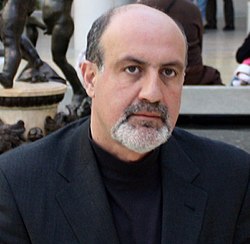Nassim Nicholas Taleb Quote
Many claim that caloric restriction (permanent or episodic) activates healthy reactions and switches that, among other benefits, lengthen life expectancy in laboratory animals. We humans live too long for researchers to test if such restriction increases our life expectancy (if the hypothesis is true, then the subjects of the test would outlive the researchers). But it looks like such restriction makes humans healthier (and may also improve their sense of humor). But since abundance would bring the opposite effect, this episodic caloric restriction can be also interpreted as follows: too much regular food is bad for you, and depriving humans of the stressor of hunger may make them live less than their full potential; so all hormesis seems to be doing is reestablishing the natural dosage for food and hunger in humans. In other words, hormesis is the norm, and its absence is what hurts us.
Many claim that caloric restriction (permanent or episodic) activates healthy reactions and switches that, among other benefits, lengthen life expectancy in laboratory animals. We humans live too long for researchers to test if such restriction increases our life expectancy (if the hypothesis is true, then the subjects of the test would outlive the researchers). But it looks like such restriction makes humans healthier (and may also improve their sense of humor). But since abundance would bring the opposite effect, this episodic caloric restriction can be also interpreted as follows: too much regular food is bad for you, and depriving humans of the stressor of hunger may make them live less than their full potential; so all hormesis seems to be doing is reestablishing the natural dosage for food and hunger in humans. In other words, hormesis is the norm, and its absence is what hurts us.
Related Quotes
About Nassim Nicholas Taleb
Taleb is the author of the Incerto, a five-volume work on the nature of uncertainty published between 2001 and 2018 (notably, The Black Swan and Antifragile). He has taught at several universities, serving as a Distinguished Professor of Risk Engineering at the New York University Tandon School of Engineering since September 2008. He has also been a practitioner of mathematical finance and is currently an adviser at Universa Investments. The Sunday Times described his 2007 book The Black Swan as one of the 12 most influential books since World War II.
Taleb criticized risk management methods used by the finance industry and warned about financial crises, subsequently profiting from the Black Monday (1987) and the 2008 financial crisis. He advocates what he calls a "black swan robust" society, meaning a society that can withstand difficult-to-predict events. He proposes what he has termed "antifragility" in systems; that is, an ability to benefit and grow from a certain class of random events, errors, and volatility, as well as "convex tinkering" as a method of scientific discovery, by which he means that decentralized experimentation outperforms directed research.
